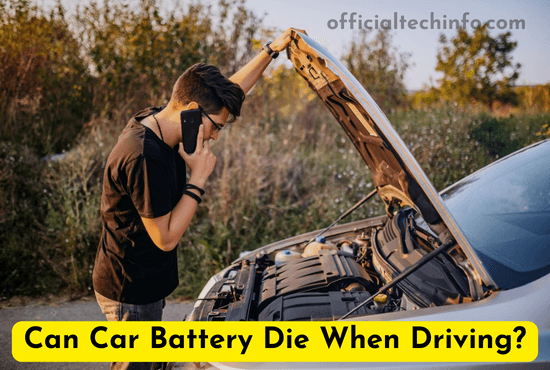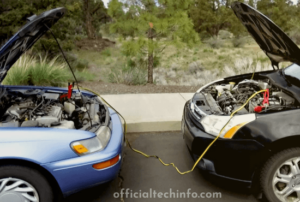Can Car Battery Die When Driving?
Have you ever thought, “Can a Car Battery Die When Driving?” Many drivers wonder and worry about this common question. In this article, we will delve into the dynamics of car batteries, exploring whether or not they can die while you are driving and what factors play a role in determining how well they perform.
Why is the car Battery Important?
It is very important to know about your car battery and how it works. when you start your car a chemical reaction takes place in the battery. This reaction changes chemical energy into electrical energy. The starter motor takes this shock of electricity to turn the engine over. It is then sent to other electrical parts of your car, such as the spark plugs, fuel injectors, headlights, alternator, and more.
The batteries in your phone may die quickly if you leave them running all the time without charging them. This problem can be fixed by the alternator which makes electricity that charges the battery while the car is running. But these parts work together the battery must first be able to hold on to the power that the alternator sends. Because they work together your car battery will still be fine if you drive all night with your headlights on.
When all of these parts are working right and together they make electricity that keeps your car running. However, if either part gets broken or stops working, you might start to feel the following.
Can a Car Battery Die While Driving?
Unfortunately, several things can cause a car battery to suddenly die while you’re on the road.
If the battery is weak or nearing its end of life, it can be overloaded by electrical demands from accessories such as air conditioning, headlights, or sound systems.
Another cause of unexpected battery failures while driving is a charging system that isn’t working properly or has loose connections.
Dimming headlights, slow engine cranking, or dashboard warning lights indicating a charging system problem are all signs of a failing battery while driving.
Signs of your car battery die
You know the battery is important, but what happens when it’s almost dead? There are a few things you can do to tell if the alternator or battery is having trouble.
- Starting problems: When you try to start your car, it might be slow or not start at all.
- Headlight flickering: many things could be causing this problem but your headlights need battery power to work. If your battery is dying your headlights may flicker or dim. On the other hand just because the headlights come on doesn’t mean that the battery can start the engine.
- Powered battery warning light: Most of the time these lights show that there is an electrical problem like the battery not being charged properly, or maybe a dead battery.
- Less power to electrical systems inside: The radio, lights, power windows, or sunroof in your car may not working properly get dim, or move more slowly.
- Less power for accessories: When you plug your phone or other electronics into the car, they might not charge.
What To Do If Car Battery Dies While Driving
Here are some most important points you must follow if you are worried about what to do if a car battery dies while driving.
- If your car’s battery dies while you’re Driving, move to a safe area away from other vehicles immediately.
- To preserve the power of the remaining battery, turn off any electrical systems that are not necessary.
- If it is at all possible, you should try to jump-start the vehicle by using jumper cables and another vehicle.
- But if you’re not sure what you’re doing with jump-starting procedures, it’s best to ask an expert.
Common Reasons for Car Battery Failure
Several things can cause a car battery to die while the car is running. Here are some examples:
- Age of the Battery: Older automobile batteries have a lower capacity to retain a charge, which increases the risk of failure, particularly under stressful driving conditions.
- Extreme Temperatures: Temperatures of very low or very high can have a detrimental effect on battery life and its capacity to provide power reliably.
- Electrical System Issues: Disruptions to the charging process, such as faulty alternators, corroded cables, or malfunctioning voltage regulators, can cause the battery to drain.
- Excessive Electrical Load: It is possible to speed up the battery’s depletion by operating numerous accessories at once, such as the headlights, air conditioner, and audio system.
- Poor Maintenance: Be careful to check the fluid levels and make sure the connections are secure regularly to keep your battery from failing too quickly.
- Corrosion: Battery drain and starting issues can be caused by corrosion on the terminals and connections that allow electricity to flow.
- Vibration: Damage to internal components and a decrease in battery life can result from excessive vibration, which can be experienced in rough driving conditions or as a result of incorrect battery installation.
Signs of a Dying Car Battery
To prevent unexpected problems, drivers should be able to understand the warning signals of a dying battery while behind the wheel. Here are some common indicators:
- Slow Cranking: If the engine is slow to start or makes a grinding noise when you turn the key, it could be a sign of a weak battery.
- Dimming Lights: If the lights inside or outside the vehicle significantly dim while you’re driving, it could be an indication of a problem with the power supply.
- Problems with the Power System: When electrical features like the power windows, radio, or dashboard lights start acting up, it could be a sign of a problem with the battery.
- Warning Lights: When driving, pay attention to any dashboard warning lights that come on, such as those for the alternator or battery.
How to Prevent Car Battery Failure?
If you want your car battery to last as long as possible and work as efficiently as possible, follow these tips:
- Regular Maintenance: Follow the manufacturer’s recommendations for when to inspect and maintain your batteries.
- Proper Charging: Never charge the battery to a dangerous level and always use a charger that is compatible with the battery.
- Keep Terminals Clean: To maintain a secure connection and keep corrosion at a distance, clean the battery terminals regularly.
- Monitor Parasitic Drain: Keep an eye out for any systems or accessories that could lead to parasitic drains, and fix any problems as soon as you notice them.
- Secure Installation: Make sure the battery is well-protected from shock and vibration after installation.
- Temperature Control: When the weather is hot, park your car in a shaded area; when the weather is cold, think about using a battery insulation kit.
Also Read
- Can I drive my car if it says service StabiliTrak? 10 Secrets
- How to reset steering assist is reduced drive with care
- How to fix ESC on a car
- Why does my car make a noise when I turn
Conclusion
Even though car batteries usually don’t die while you’re on the road, several things can cause them to suddenly fail. The best way for drivers to avoid problems when driving is to know how car batteries work, how to tell when a battery is about to die, and to do preventative maintenance.
FAQs
Can battery die while driving?
Car batteries dying while driving is an uncommon occurrence, but it can happen due to things like excessive electrical loads or malfunctioning charging systems.
What happens if my car battery dies while driving?
Your car can stop while you’re driving if the alternator stops working and the battery dies. If your car’s engine stops while you’re driving, you should move to the side of the road where it’s safe to do so. Try to signal right away if you’re in the middle of the highway.
How long does a car battery last with driving?
Anywhere from three to four years is when your car will need a new battery. Part of regular maintenance is getting a new battery for your car. At every service visit every three years, even if you haven’t needed a new battery yet, your battery will be checked and inspected.

